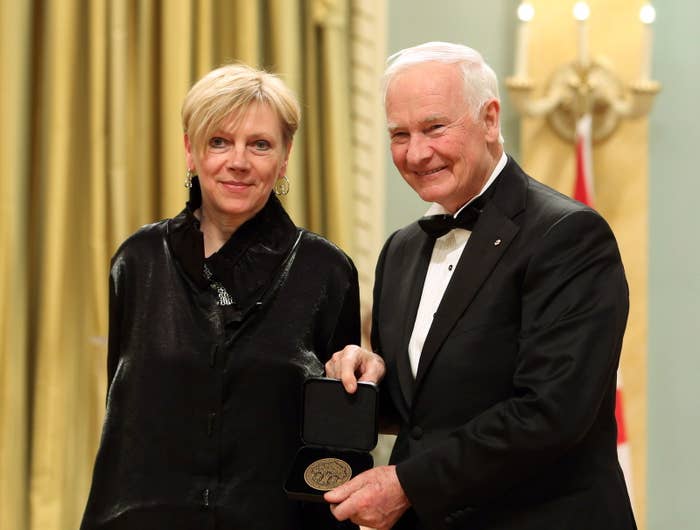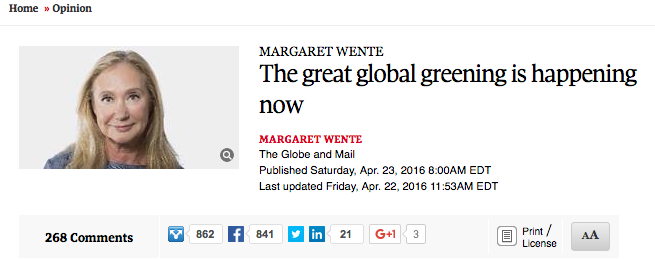The Globe and Mail today said it will publish corrections with apologies after star columnist Margaret Wente was found to have plagiarized in two recent columns. Wente was disciplined by the paper in 2012 after it was revealed she lifted work from other writers.

University of Ottawa professor Carol Wainio, whose research led to the 2012 Wente controversy and disciplinary action, raised new concerns in a Saturday post on her blog. Wainio said Wente's latest column contained unattributed text from two different sources.
BuzzFeed Canada reported on Sunday that Globe editor David Walmsley said the paper was "looking into" the allegations. On Monday, the paper's public editor, Sylvia Stead, published a column that acknowledged Wente did use passages without attribution. Stead wrote that as a result the paper will publish two corrections to the offending Wente columns.
Walmsley was quoted as saying, “This work fell short of our standards, something that we apologize for. It shouldn’t have happened and the Opinion team will be working with Peggy to ensure this cannot happen again.”
Stead wrote that "Ms. Wente said she deeply regrets these mistakes."
Stead's column did not mention Wente's previous plagiarism, detail any disciplinary action being taken, or say if the paper intends to review Wente's other columns.
In her blog post, Wainio wrote that Wente’s April 23 column contains one sentence reproduced verbatim without attribution from an article by Jesse Ausubel in the spring 2015 issue of The Breakthrough Journal. While the article is mentioned and linked in Wente’s column, Ausubel is not credited for the sentence or for what Wainio calls two other incidents of “paraphrase without direct attribution.”
Wainio also said Wente borrowed from an article by UC Berkeley researcher Maywa Montenegro in Ensia magazine without citing or linking to her work.

The Globe and Mail’s Editorial Code of Conduct says “it is unacceptable to represent another person’s work as your own. Excerpts from other people’s prose must be attributed so as to avoid even a suspicion of copying.”
In 2012, The Globe's then-editor-in-chief John Stackhouse said in an internal memo that Wente's work "did not meet the standards of The Globe and Mail, in terms of sourcing, use of quotation marks and reasonable credit for the work of others. Even in the spirit of column writing, which allows for some latitude in attribution and expression, this work was not in accordance with our code of conduct, and is unacceptable.”
After being subject to unspecified disciplinary action by The Globe, Wente defended herself in a column that addressed the allegations. “I'm far from perfect. I make mistakes. But I'm not a serial plagiarist.”
In the wake of the 2012 controversy, The Globe and Mail did not make public the action it took against Wente, although her column did skip one scheduled publication date. The paper also did not make public the extent to which it investigated Wente's previous work for instances of plagiarism.

Other publications such as Wired, in the case of Jonah Lehrer, and BuzzFeed, in the case of Benny Johnson, extensively reviewed past work when their writers faced multiple plagiarism allegations. An independent investigation by NYU's Charles Seife for Wired and an internal investigation at BuzzFeed revealed more incidents of plagiarism.
Seife told BuzzFeed Canada he believes Wainio's newest allegations do amount to plagiarism and, given Wente's history, should result in a full investigation.
"Plagiarism isn't always black and white; for me, this crosses the line, though not everyone will agree with me," he said. "However, given Ms. Wente's history, I think it's extremely troubling."
After being contacted for comment, Seife decided to look at some of Wente's recent work. He quickly discovered another example that concerns him.
"A casual look at Ms. Wente's recent columns gave another parallel: look, for example, for the phrase 'muscle that can be exercised to exhaustion' in this Wente column from March 2016 versus this Slate article which was published a week earlier," he said.
Slate's Daniel Engber used the phrase when referring to the limits of human willpower. Wente did so in the same context.
Willpower, argued Baumeister and Tice, draws down mental energy—it’s a muscle that can be exercised to exhaustion.
Wente, six days later:
The prevailing theory is that willpower is a finite resource, like a muscle that can be exercised to exhaustion.
"Given that I turned this up in a few minutes of reading, yes, I would say that a full review of Ms. Wente's columns is more than justified," Seife said.
Wainio told BuzzFeed Canada she mostly stopped reading Wente in the years since the 2012 controversy.
“I had the impression after the 2012 problems that editors must have been scrutinizing it more carefully, and haven't read her with any regularity for the last year or two,” she said. “It's just coincidence that I was in Montréal Friday for the opening of an exhibition in which I had some work and someone mentioned her. It occurred that I hadn't looked closely at a column in a while.”
Wente did not reply to a request for comment.
